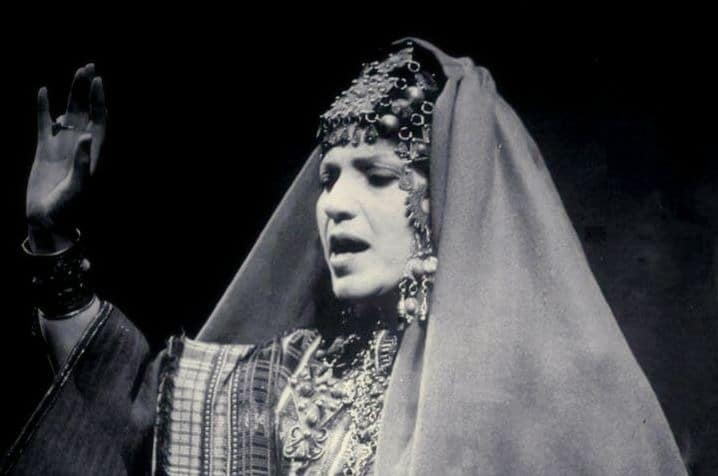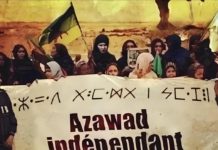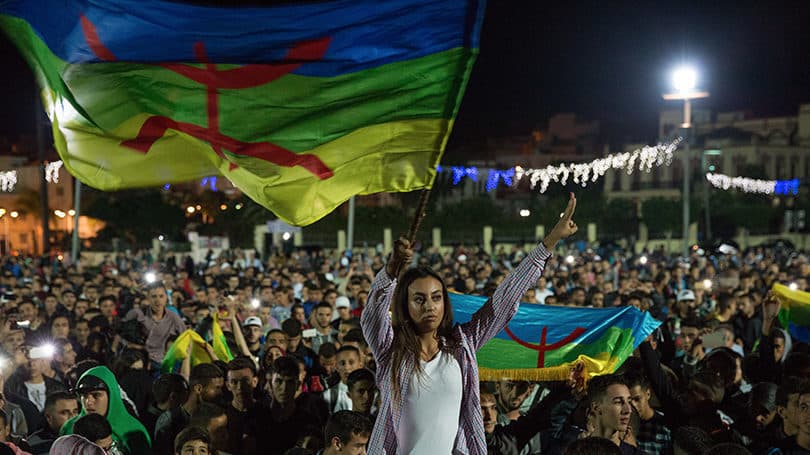
By Fazia Aitel,
The ambiguity of Taos Amrouche’s identity first emerges with the different names she used as a writer (Marie-Louise Amrouche, Marguerite Amrouche and Taos Amrouche). The insecurity in choosing her pen name put her in a process of self-questioning, a quest for her identity. In spite of the significance of her investigation and the fact that she was the first Amazigh woman writer, Taos Amrouche did not trigger major interests among critics who have totally ignored her work until Denise Brahimi’s recent study.
Taos Amrouche is a very atypical writer, hence one has to take into consideration the numerous characteristics of her problematic identity: not only was she an Amazigh woman, but she was also a Christian French citizen born in Tunisia. Fears, contradictions, and desires which seethe from these elements are at the core of her work. Her narratives indicate her inability to be satisfied with her life and the alienation that results from it. However, the display of her open wounds do not reduce the issues at stake to a self-centered obsession. Her call for the recognition of her gender, language, and culture emanates from the text like obliterated signs of a palimpsest. Taos neither blames nor denounces anyone in her narratives: her sole ambition is to publicly present through her characters some aspects of a complex and intertwined situation, living in hopes of reaching a plausible interpretation. Hence she disengages herself from her contemporary Algerian writers such as Mouloud Mammeri, Mouloud Feraoun or even her own brother Jean Amrouche, who was politically involved in the peace process in Algeria. Taos does not write on behalf of a country or people, instead she strives to reveal her internal world. Her struggle is a personal one through which one can perceive fundamental issues such as sentimental failure, exile, as well as a specific colonial and religious circumstances.
Taos’ emphasis on personal history explains her autobiographical writing style. This genre is extremely complex and subtle and needs a scrupulous reading that always resists an easy and unproductive juxtaposition between the narrative and the genuine autobiographical data. The question of how to publicly express one’s difference without being excluded from society is intrinsic to the problematic of writing for any writer. Through the use of the language, the writer seeks to articulate that difference in relationship to the symbolic representation of its medium of expression. It is like the existence of two opponents, for one to overcome the perilous challenge in articulating its Being, supposes the recognition by the other of the existence of the first one as a legitimate opponent. To do so, it is necessary to establish a common denominator that allows the launching of the communication process between the two parties. Therefore, one would start with a similarity with the other, and the ultimate illustration would be the common human condition. The acquisition of the right to articulate one’s ideas does not necessarily mean emancipation from the dominant voice. Even when the dominant voice has recognized and accepted the dominated difference, it will be limited in its expression. In this case, the difference is acknowledged, but with a constant reminder of the similarities. However, Taos, does not hide nor simulate the tensions, and conflicts, generated by an antagonistic approach of different cultures.
In an article on Mouloud Mameri, Pierre Bourdieu claims that the accession to the dominant culture always require a compensation. “En dramatisant un peu, Mouloud Mammeri avait du payer son acces a la culture tacitement reconnue comme universelle d’une sorte de meurtre du pere. Le premier roman du jeune Kabyle converti sacrifiait en quelque sorte la Kabylie paternelle sur l’autel de la grande culture universelle”. The cultural shame that results from the inculcation of the dominant culture to those who didn’t inherit it, turns out to be a determining factor in the intellectual process of accessing the culture. Bourdieu, calls this system “l’acculturation deculturante.” Therefore, it is crucial to undergo the re-appropriation of the denied culture. However, the re-appropriation that Taos strives for, belongs to another dimension. In her case, the “devaluation” of a culture at the detriment of another one is not expressed within the regular pattern of an antagonism between the private environment which contains the “devalued” culture and the public one associated with the “valued” culture.
Taos Amrouche experiences this crisis from both the Amazigh and French cultures in which she grew up. The imposition of a value system of one culture over another discourages any movement towards a healthy interaction, since an equal value of both cultures will never be reached. A domination or a subjugation deprived of any dynamism always leads to an internal fracture. Indeed, the heroines in Taos Amrouche’s novels inherit an inability to negotiate an identity as a coherent entity. This further exposed by the maternal disapproval of an original recognition among the heroines’ peers. For example, in “Rue des tambourins” , Kouka is always kept away from Muslim celebrations. Furthermore her mother unwillingly let her wear kabyle clothing, thinking that they are just old rags. therefore, the internal contraditions created by the submission to an abusive mother leads to an invalid system of reference for the daughter. Taos expresses this divergence through the disturbed sexuality of her heroines. Obviously, sexuality is a “privileged” space for the expression and the building of identity. The heroines relationship to their bodies is a symptom of an existential questioning.
In order to voice multiple issues, Taos Amrouche exploits the body, which allows multiple symbolic transactions to take place. The process of speaking up for oneself that is so parsimonious among Amazigh women will gain if articulated more often, This is why Taos Amrouche’s work remains exceptional and exemplary.
Amazigh Voice, Volume 7.

















